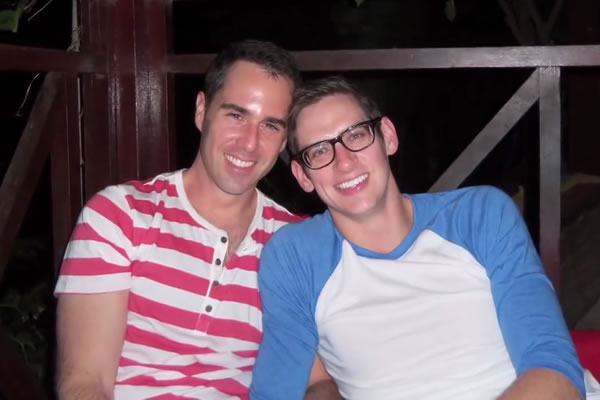News
Gay ambassador reflects on U.S. efforts in Ukraine
Baer talks monitoring mission, being openly gay in negotiations with Russia
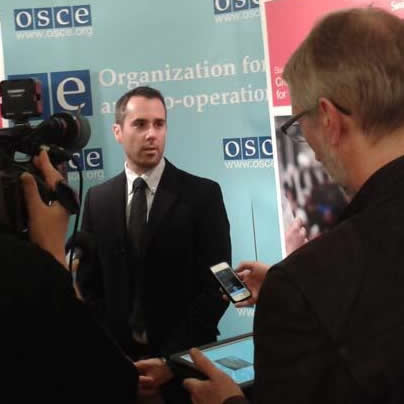
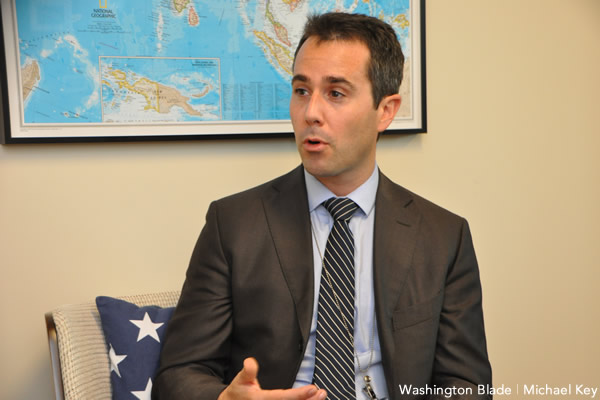
Gay U.S. ambassador Daniel Baer is representing U.S. interests during the Ukraine crisis at the Organization for Security & Cooperation in Europe (Washington Blade photo by Michael Key).
Amid the ongoing crisis in Ukraine following Russian President Vladimir Putin’s military incursion into the country, the Obama administration is relying on a gay ambassador to help de-escalate tensions.
Daniel Baer, U.S. ambassador to the Organization for Security & Cooperation in Europe, has in the days since the start of the crisis been working with envoys at the Vienna-based pan-Atlantic international forum to address the situation — in addition to keeping the world updated via his Twitter account.
His priority for the moment is achieving a consensus to allow a OSCE-based monitoring mission to enter Ukraine, although he admits he’s under “no illusion” that will be easy in a body on which Moscow has veto power.
In an interview with the Washington Blade via phone from Vienna after the third emergency meeting at the forum in as many days, Baer described the multi-level approach the United States is undertaking to de-escalate tensions in Ukraine.
“In the past, we’ve seen in other situations where there have been similar concerns raised, a monitoring mission [has worked] by both assessing and reporting facts on the ground and by being there to work to mediate tension and addressing the concerns that have been raised,” Baer said.
But Baer’s participation has significance because he’s openly gay and handling negotiations with a country that is known for enacting anti-LGBT laws and having an anti-LGBT climate.
Nonetheless, Baer, 37, said he’s never felt that his sexual orientation has been an issue for Putin’s representatives at OSCE.
“Just like being gay, working with the U.S. ambassador is not a choice, and I’m ready to work with all of them,” Baer said.
Founded during the Cold War, the OSCE was set up as a forum for the United States and the Soviet Union to speak about concerns and has become a pan-Atlantic forum now comprising 57 European, Asian and North American countries.
After the U.S. Senate confirmed Baer in August as U.S. envoy to OSCE, he relocated to Vienna with his partner of three-and-a-half years Brian Walsh, 27, a physicist now working at an international think-tank on environmental issues.
The transcript of the interview between the Washington Blade and Baer follows:
Washington Blade: How would you characterize the situation in Vienna as the crisis in Ukraine unfolds?
Daniel Baer: I guess a couple things. The OSCE is a big political organization, and an operational entity that has field offices in 16 countries, including Ukraine and many independent institutions that are doing things all the time. So, there’s been kind of two levels of activity.
One, there’s been a sense of urgency in terms of getting the existing capacities of OSCE mobilized to engage in Ukraine, and particularly in Crimea now, in the ways that they can to help de-escalate tension. So, there’s a High Commissioner for National Minorities, the Swiss special envoy who’s the current ambassador to Germany now, but a designated special envoy to Ukraine who sits as the chair of the OSCE right now. The Representative on Freedom of the Media, they just arrived in Crimea a couple hours ago, and then the project office in Kiev is being supplemented.
In addition, because OSCE does arms control, and military transparency, the Ukrainians have invited military monitoring missions. They have an invitation for two military monitors from every participating state in the OSCE.
Then, there’s the political side, and lot of people focus on the downside of the OSCE, which is you operate on consensus. And it’s a big tent that includes the Russian Federation, the United States, Canada and basically everybody in between — and Mongolia. That is both a hindrance, in the sense that it makes consensus harder, but it’s also an asset in the sense that the other project that we’re starting to work on now is trying to develop a mandate for a new special monitoring mission to Ukraine and that will require consensus, but the upside is that if we can find a description of a mandate that works for everyone, it will also have the political value of being blessed by Ukrainians, the Federation, the EU countries, Turkey, ourselves and Canada.
So, it’ll have broad backing. And so, we’re kind of taking the two-pronged approach of mobilize quickly everything that’s already set up and teed up, and ready to go, and also look at this kind of near-to-medium term possibility of setting up a monitoring mission.
That’s something that I’m under no illusions — I think it’s going to be very hard, and really all we can do is tee it up, and leave that door open. And if and when the Russian Federation decides to engage on that and walk through that door, we’ll be ready to work with them.
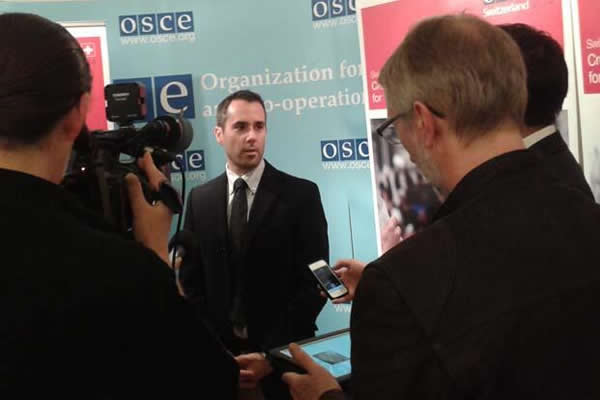
U.S ambassador to the Organization for Security and Cooperation in Europe (OSCE) Daniel Baer addresses the media following a meeting. (Photo public domain)
Blade: What makes setting up that monitoring mission “very hard”? I know Moscow has veto power on the OSCE, so how likely is it that we’ll actually see that happening?
Baer: I think the answer is it won’t happen unless Moscow decides that they see value in it, or they think it can be useful. I think our position all along has been there are a variety of concerns that have been raised by the Russian Federation, including concerns about the security of their military base and the human rights of the Russian minority in Crimea, and Ukraine more broadly, etc. There are obviously concerns that are being raised by the Ukrainians themselves about a Russian military incursion on their territory.
But the way to address the concerns that the Russians have raised is not through sending in troops, but through a monitoring mission. And this is an alternative for them. In the past, we’ve seen in other situations where there have been similar concerns raised, a monitoring mission [has worked] by both assessing and reporting facts on the ground and by being there to work to mediate tension and addressing the concerns that have been raised. Yes, they have to choose to take that route instead of the illegal and illegitimate route that they are currently taking, but… one of the ways in which we can make de-escalation more likely is by teeing up that choice, so they can make that choice. …
Blade: Let’s get a little personal. What do you think is the significance of an openly gay person representing U.S. interests in diplomacy with Russia, a country that has passed laws against gay people?
Baer: You know, I think to all of my colleagues when I showed up here in Vienna, most of my colleagues only knew one or two things about me. Everyone knew that I was gay, and the other thing talked about was that I was young. Other than that, they knew that I was an American ambassador. Six months later, it’s certainly more important that I’m the U.S. ambassador than anything else about me, and I have a decent working relationship with all my colleagues.
I have a weekly meeting with the Russian ambassador, and Brian and I have invited him and his wife to the Marine ball along with others. So, we built a working relationship. I guess it would be an interesting question for him. For me, I’m trying to do my job the best I can and represent my country the best I can.
I think one of the strengths that America has is that we increasingly — there’s still work to do on many dimensions — but we increasingly have a diplomatic corps that represents our diversity, and part of that is important because it makes us more effective. Part of that is important because it more accurately represents the country. And it’s super important because part of what others see as valuable and powerful and engaging and attractive about America is the promise of progress toward a society that embraces rights for everyone. I don’t see that as having anything to do with me, per se, but to the extent that there’s a broader story there. I think it’s valuable that we continue to make progress on that front.
Blade: So no Russian officials refused or expressed any reluctance to negotiate with you because of your sexual orientation?
Baer: I have not had any experience where they have refused to engage with me. For some people, whether Russian or otherwise, I’m the first ambassador from the United States that they’ve known was gay and they have to work with. I guess one of the advantages of being the U.S. ambassador in a multi-lateral institution is that it’s pretty hard to be effective and not work with the U.S. ambassador — one way or the other. Just like being gay, working with the U.S. ambassador is not a choice, and I’m ready to work with all of them. And I certainly go into it giving everybody the benefit of the doubt that it isn’t an issue because it shouldn’t be an issue.
Blade: You said they haven’t refused, but have they expressed any reluctance to work with you because of your sexual orientation?
Baer: Not to me. Not to me. If they have, they’ve kept it from me.
Blade: Let’s get back to the bigger picture. Regarding Secretary of State John Kerry’s visit to Ukraine, what impact do you think it’ll have on the situation?
Baer: I think the secretary has actually come and has already arrived in Paris, and will meet with [Russian] Foreign Minister [Sergey] Lavrov in Paris tomorrow. But he spent today in Kiev. I think everybody recognizes that the people of Ukraine have a new temporary government. An election’s declared for May 25. It’s usually important that there is strong support for free and fair elections, and a free and fair campaign environment. Everybody is rightfully focused on the security crisis in Crimea, and also in the rest of the country, there’s a lot of work to do.
And I think the people of Ukraine need to be supported in their efforts to build a prosperous, free, democratic Ukraine. And that’s going to take a lot of support from the international community, and I think Secretary Kerry is going to demonstrate our support for the transition government that is there until the election and our willingness and readiness to help support them in their efforts to build a free, democratic Ukraine.
Blade: How is Kerry being there having an impact as opposed to monitoring the situation from overseas?
Baer: Well, I think, certainly there’s a diplomatic value to it in terms of the conversations that you have, and, of course, it also sends a signal. So if being there sends a signal that the depth of the U.S. commitment and our engagement with the government, I think that signal is an important one to send, particularly at a moment like this.
Blade: What about sanctions? A number of European countries seem reluctant to impose sanctions on Russia. What actually can this administration do to convince its NATO allies and trading partners to get on the program for sanctions with real teeth against Russia?
Baer: Oh, I think the president and Secretary Kerry have had a number of conversations over the last 72 hours and 96 hours with allies and partners in Europe, and I think although the EU has its own function, and we have ours, etc., I think there’s a lot of strong cooperation right now on ways to respond to Russia’s illegal actions…I think there is strong cooperation between the U.S. and the E.U. and individual member states in the E.U. making clear that the Russian incursion and military presence is unacceptable and that they need to go back to their bases, and that it’s up to President Putin to do the right thing and de-escalate the situation.
Blade: Do you see that co-operation extending to an agreement on sanctions with Europe with regard to Russia?
Baer: Like I said, the secretary and president are working very hard to keep our allies and partners appraised of our steps, and to coordinate those. I think those conversations are ongoing, and I think that that strong cooperation will continue.
Blade: What do you think Putin is trying to accomplishment with this incursion? Restoration of the Soviet Union?
Baer: I don’t know. That’s a question for President Putin. I don’t know what he’s trying to accomplish, but certainly the steps that he’s taking are not contributing to stability in the region, to the future of a strong Ukraine, which Russia has everything to gain from as a close neighbor. Russia and Ukraine are going to have a relationship determined by geography if not by partnership, and so Russia has everything to gain from a strong Ukraine. There’s not an either-or choice, and the actions that Mr. Putin have taken are a violation of international law, they’re a violation of many commitments the Russian Federation has made, including here at the OSCE with respect to the sovereignty and territorial integrity of participating states. And they’re a violation of reason, and they are not in Russia’s interest, and certainly not in Ukraine’s.
Blade: What’s your reaction to today’s news that Putin said he sees no reason for Russian forces to intervene in eastern Ukraine at the moment but that Russia “reserves the right to use all means at our disposal to protect” Russian speakers if they are in danger?
Baer: I think I reject the rationale that has been offered for the military incursion and invasion so far, and there’s no defensible rationale for further movement. The right direction for the troops to move is not further, but back to their bases.
Blade: Do you think that comment is troubling?
Baer: Like I said, I think there’s no good rationale for the Russian Federation to have its troops on Ukrainian soil.
Blade: Do you see any scenario in which this crisis will escalate into military engagement involving the United States?
Baer: Nobody wants an escalation into war, so all of our efforts are focused on de-escalating the situation through direct diplomatic engagement and the deployment of an international monitoring force either through the OSCE or the UN. They’re other ways to approach this, but we’re certainly working around the clock to the head in that direction.
Blade: Is it safe to say military engagement is off the table?
Baer: That’s not a question for me.
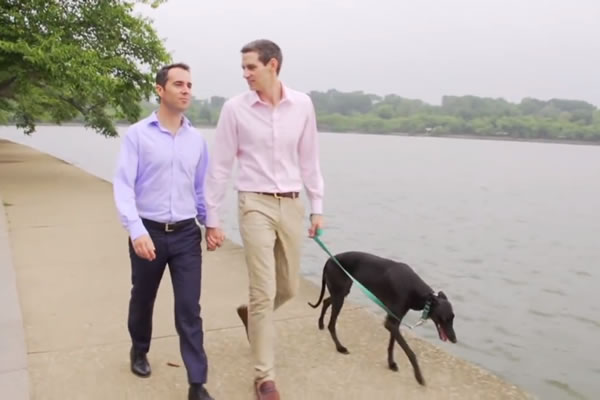
U.S. ambassador for the Organization for Security and Co-operation in Europe (OSCE) Daniel Baer with partner Brian Walsh. (Image public domain)
Blade: Let’s get back to some personal stuff. How is the situation with Brian since you’ve moved to Vienna and since the start of his crisis?
Baer: I get to spend far less time with Brian, but other than that it hasn’t changed anything. We’re settling well, and he’s incredibly supportive.
Blade: Do you have any anecdotes about any activities you too had engaged in since you’ve moved to Vienna?
Baer: Well, it’s been a big change because it’s a new country and a new job. And we’ve been skiing in Austria, and that was fun. Being a diplomat overseas is very different from working in the State Department. One of the advantages being here in this post is you have 56 other ambassadorial colleagues and there’s an interesting and diverse group of people to get to know.
We’re settling into that world, and the whole time, we’re very, very much aware of the fact that this is a temporary arrangement. We’re trying to make the most of it. Enjoy the hard work, enjoy the fun and cool parts of the job.
Blade: Let’s get back to Russia. How do you evaluate how Russia handled the Olympics?
Baer: I think we’re all glad that the Olympics came off without any security incidents, etc. I think, as everyone knows, there was a great deal of investment of resources and political attention in the Olympics, and I was proud of U.S. athletes.
Blade: There were reports that were some arrests of demonstrators, including those protesting about LGBT rights. Were you aware of that and do you think they were cause for concern?
Baer: Yes. It’s always of concern when there are arrests of people protesting. In the Russian Federation, unfortunately, it’s not extraordinary. And there were arrests this past weekend of protesters who were protesting Russia’s invasion. Several hundred people were detained, I believe. I should check the reports. And there was a sentence last week of protesters, people who protested in the Bolotnaya Square, protests in 2012. So, Russia’s recent record on freedom of expression and freedom of association and assembly is not encouraging.
Blade: Russia has passed anti-gay laws that were criticized by the international community. Now that the Olympics are over, what is going to happen to LGBT people in Russia?
Baer: I think there are two things. One, we will continue to call out the so-called gay propaganda law and the other laws that have either been proposed or enacted along with it. Obviously, they’re inconsistent with internationally recognized human rights, and that such laws not only affect gay people, but the broader population, and also have a teaching effect, which creates a climate in which the rights of LGBT rights are most likely to be disrespected. We’ve seen an uptick in the kind of vigilante beatings of LGBT people posted online. The climate of intolerance that such laws encourage is something to be deeply concerned about.
That said, I think one of the things that it’s really important to focus on is that it’s not only gay people who have their rights trampled in the Russian Federation. Minorities, migrants from neighboring countries that represent minority populations suffer enormous discrimination, and obviously any Russian citizen has a hard time expressing political views that are critical of the government or joining a peaceful protest. The anti-gay laws are actually happening against a much broader recession on human rights more generally.
Blade: And what do you think is the best way forward to address that by the international community?
Baer: I think first of all, I always start from the premise that lasting change comes from within, so to continue to shine a light on human defenders and advocates who are making the case for change where they are — both LGBT, and more broadly, the human rights defenders and activists — and to call out the cases when their rights are violated. I think making the case to the Russian population more broadly as well to Russian leadership that a strong stable Russian Federation does not come from doubling down on restrictions it comes from democratic progress, including people who have respect for human rights. You have to make the political argument, and you have to call out the failures, and to continue to press, and know that doors will open where you don’t expect them, and you need to be ready to walk through them.
By calling out people’s situations, you remind them that they’re not alone and that they have people who are with them, and, over the long run, you push and you push and you push.
There’s a strong civil society that understands all of the reasons why the backsliding on human rights more broadly is bad for business, and all around it’s bad for Russia, and that trajectory needs to be turned around.
Blade: What about upcoming plans for you and Brian?
Baer: We’re getting married this summer. We haven’t quite figured that out yet because same-sex marriage isn’t legal in Austria, but we’re working on that. But in August.
National
Supreme Court deals blow to trans student privacy protections
Under this ruling, parents are entitled to be informed about their children’s gender identity at school, regardless of state protections for student privacy.

The Supreme Court on Monday blocked a California policy that allowed teachers to withhold information about a student’s gender identity from their parents.
The policy had permitted California students to explore their gender identity at school without that information automatically being disclosed to their parents. Now, educators in the state will be required to inform parents about developments related to a student’s gender identity, depending on how the case proceeds in lower courts.
The case involves two sets of parents — identified in court filings as John and Jane Poe and John and Jane Doe — both of which say their daughters began identifying as boys at school without their knowledge, citing religious objections to gender transitioning.
The Poes say they only learned about their daughter’s gender dysphoria after she attempted suicide in eighth grade and was hospitalized. After treatment for the attempt and after being returned to school the following year, teachers continued using a male name and pronouns despite the parents’ objections, citing California law. The Poes have since placed their daughter in therapy and psychiatric care.
Similarly, the Does say their daughter has intermittently identified as a boy since fifth grade, but while their daughter was in seventh grade, they confronted school administrators over concerns that staff were using a male name and pronouns without informing them. The principal told them state law barred disclosure without the child’s consent.
Both sets of parents filed lawsuits in the U.S. District Court for the Southern District of California challenging the state policy that protects students’ gender identity and limits when schools can disclose that information to parents.
The justices voted along ideological lines, with the court’s six conservative members in the majority and the three liberal justices dissenting.
“We conclude that the parents who seek religious exemptions are likely to succeed on the merits of their Free Exercise Clause claim,” the court said in an unsigned order. “The parents who assert a free exercise claim have sincere religious beliefs about sex and gender, and they feel a religious obligation to raise their children in accordance with those beliefs. California’s policies violate those beliefs.”
In dissent, the three liberal justices argued that the case is still working its way through the lower courts and that there was no need for the high court to intervene at this stage. Justice Elena Kagan wrote, “If nothing else, this Court owes it to a sovereign State to avoid throwing over its policies in a slapdash way, if the Court can provide normal procedures. And throwing over a State’s policy is what the Court does today.”
Conservative Justices Samuel Alito and Clarence Thomas indicated they would have gone further and granted broader relief to the parents and teachers challenging the policy.
The emergency appeal from a group of teachers and parents in California followed a decision from the United States Court of Appeals for the Ninth Circuit that allowed the state’s policy to remain in effect. The appeals court had paused an order from U.S. District Judge Roger Benitez — who was nominated by George W. Bush — that sided with the parents and teachers and put the policy on hold.
The legal challenge was backed by the Thomas More Society, which relied heavily on a decision last year in which the court’s conservative majority sided with a group of religious parents seeking to opt their elementary school children out of engaging with LGBTQ-themed books in the classroom.
California Attorney General Rob Bonta expressed disappointment with the ruling. “We remain committed to ensuring a safe, welcoming school environment for all students while respecting the crucial role parents play in students’ lives,” his office said in a statement.
The decision comes as the Trump administration has taken a hardline approach to transgender rights. During his State of the Union address last week, President Donald Trump referenced Sage Blair, who previously identified as transgender and later detransitioned, describing Blair’s experience transitioning in a public school. According to the president, school employees supported Blair’s chosen gender identity and did not initially inform Blair’s parents.

Last year, the court upheld Tennessee’s ban on gender-affirming medical care for transgender minors and has allowed enforcement of a policy barring transgender people from serving in the military to continue during Trump’s second term.
District of Columbia
D.C. Black Pride theme, performers announced at ‘Speakeasy’
Durand Bernarr to headline 2026 programming

The Center for Black Equity held its 2026 DC Black Pride Theme Reveal event at Union Stage on Monday. The evening, a “Speakeasy Happy Hour,” was hosted by Anthony Oakes and featured performances by Lolita Leopard and Keith Angelo. The Center for Black Equity organizes DC Black Pride.
Kenya Hutton, Center for Black Equity president and CEO, spoke following the performances by Leopard and Angelo. Hutton announced this year’s theme for DC Black Pride: “New Black Renaissance.”
Performers for 2026 DC Black Pride were announced to be Bang Garcon, Be Steadwell, Jay Columbus, Bennu Byrd, Rue Pratt and Akeem Woods.
Singer-songwriter Durand Bernarr was announced as the headliner for the 2026 festivities. Bernerr gave brief remarks through a video played on the screen at the stage.
DC Black Pride is scheduled for May 22-25. For more information on DC Black Pride, visit dcblackpride.org.
Virginia
Arlington LGBTQ bar Freddie’s celebrates 25th anniversary
Owner asks public to support D.C.-area gay bars

An overflowing crowd turned out Sunday night, March 1, for the 25th anniversary celebration of Freddie’s Beach Bar, the LGBTQ bar and restaurant located in the Crystal City section of Arlington, Va.
The celebration began as longtime patrons sitting at tables and at the bar ordered drinks, snacks, and full meals as several of Freddie’s well-known drag queens performed on a decorated stage.
Roland Watkins, an official with Equality NoVa, an LGBTQ advocacy organization based in the Northern Virginia areas of Arlington, Alexandria, and Fairfax County, next told the gathering about the history of Freddie’s Beach Bar and the role he said that owner Freddie Lutz has played in broadening the bar’s role into a community gathering place.
“Twenty-five years ago, opening a gay bar in Arlington was not a given,” Watkins told the crowd from the stage. “It took courage, convincing, and a deep belief that our community belongs openly, visibly, and proudly,” he said. “And that belief came from Freddie.”
Watkins and others familiar with Freddie’s noted that under Lutz’s leadership and support from his staff, Freddie’s provided support and a gathering place for LGBTQ organizations and a place where Virginia elected officials, and candidates running for public office, came to express their support for the LGBTQ community.
“Over the past 25 years, Freddie’s has become more than a bar,” Watkins said. “It has become a community maker.”
Lutz, who spoke next, said he was moved by the outpouring of support from long-time customers. “Thank you all so much for coming tonight and thank you all so much for your support over the past 25 years,” he said. “I can’t tell you how much that means to me and how much it’s kept me going.”
But Lutz then said Freddie’s, like many other D.C. area gay bars, continues to face economic hard times that he said began during the COVID pandemic. He noted that fewer customers are coming to Freddie’s in recent years, with a significant drop in patronage for his once lucrative weekend buffet brunches.
“So, I don’t want to be the daddy downer on my 25-year anniversary,” he said. “But this was actually the worst year we’ve ever had,” he added. “And I guess what I’m asking is please help us out. Not just me, but all the gay bars in the area.” He added, “I’m reaching out and I’m appealing to you not to forget the gay bars.”
Lutz received loud, prolonged applause, with many customers hugging him as he walked off the stage.
-

 India5 days ago
India5 days agoActivists push for better counting of transgender Indians in 2026 Census
-

 Advice5 days ago
Advice5 days agoDry January has isolated me from my friends
-

 National5 days ago
National5 days agoAfter layoffs at Advocate, parent company acquires ‘Them’ from Conde Nast
-

 District of Columbia5 days ago
District of Columbia5 days agoCapital Pride reveals 2026 theme

